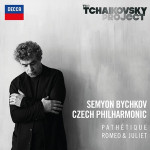|
Back
11/06/2016
“The Tchaikovsky Project: Volume 1”
Pyotr Ilyich Tchaikovsky: Symphony Nº 6 in D minor, Opus 4 “Pathétique” – Romeo and Juliet Fantasy-Overture
Czech Philharmonic, Semyon Bychkov (Conductor)
Recording: Dvorák Hall, Rudolfinum, Prague, Czech Republic (August 17-19 & September 24-26, 2015) – 63’53
Decca # 483 0656 - Booklet in English, French and German

   
This anticipated collaboration, matching Decca and the Czech Philharmonic lands on the classical music map, the first volume of a major cycle of Tchaikovsky works. Chosen to conduct the 122 year old orchestra, Seymon Bychkov sets out to express his own “Tchaikovskython” charter by beginning with the crowning Pathétique and ending with the indelible Romeo and Juliet Fantasy-Overture. In Warwick Thompson’s forward he writes, “Bychkov also feels that it [the Czech Philharmonic] has a particularly close affinity with the output of Tchaikovsky, whose music combines both the Russian and the Austro-German symphonic traditions.” Bychkov continues, “There are lots of young players; you can feel a tremendously positive energy of renewal.” That said, here is where Mr. Bychkov misses the mark. Positive energy doesn’t necessarily translate into persuasive interpretation.
Without question, agitation and self-doubt pervaded the mind of Tchaikovsky, and that, within itself, should be deeply reflected within these two iconic Russian pieces; however, the overall impression on this release yields music that’s way too rushed to express what’s really the root cause of Tchaikovsky’s life-long dilemma: his homosexuality. Bychkov’s music has an “endless forgetfulness”, nullifying the emotional toll behind the composer’s pen. Instead, we hear a rash, rush-rush approach to the musical schematic.
The closing argument in the Pathétique (“Adagio lamentoso”) is off target. There should be a searing, ripping heartbreak inside the strings’ section…it doesn’t happen. Where this unleashed push should be redirected is in the previous movement, “Allegro molto vivace.” For the most part, it does, but from a sound perspective there’s shallowness inside the bass; the sound is a tad tinny and loaded with cacophony in the closing bars. Unsettling.
Tempestuous and riling can bracket the glances within the Romeo and Juliet Fantasy-Overture. While Mr. Bychkov generally emotes the three idées convincingly, a degree of imbalance in power is skewed behind the baton. For instance, the “Love Theme” simply jumps into fast forward, causing the blissful connection to hiccup.
While a rushed tempo nuzzles inside those sections deemed testy, the inertia leaps out of bounds and never recoils.
Christie Grimstad
|